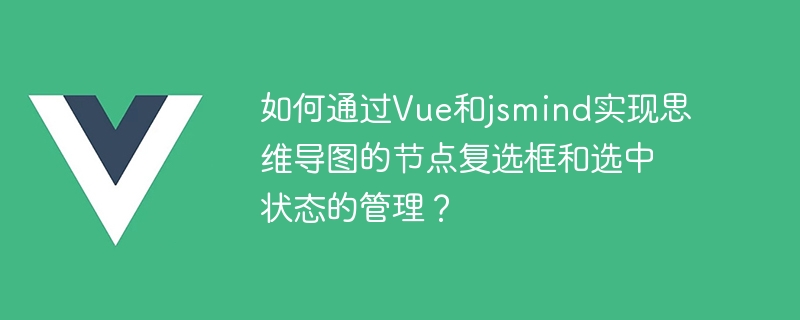

How to manage node checkboxes and selected states of mind maps through Vue and jsmind?
Introduction:
In daily life and work, mind maps are often used to organize and display various information. With the continuous development of web development, it has become more and more convenient to implement an interactive mind map through Vue and jsmind. This article will introduce how to use Vue and jsmind to manage the node check boxes and selected states of mind maps.
First, install jsmind and Vue in your project. It can be installed and imported through npm or directly introducing js files. In your HTML file, add the following introduction:
<!-- 引入jsmind的样式文件 --> <link rel="stylesheet" type="text/css" href="jsmind/style/jsmind.css"/> <!-- 引入jsmind的核心js文件 --> <script type="text/javascript" src="jsmind/js/jsmind.js"></script> <!-- 引入Vue --> <script src="https://cdn.jsdelivr.net/npm/vue"></script>
In Vue, we need to create a Vue component to host the mind map and manage the status of mind maps. First, create a Vue component and initialize jsmind:
<template>
<div ref="jsmindContainer"></div>
</template>
<script>
export default {
mounted() {
// 创建jsmind实例
const mind = {
"meta": {
"name": "jsMind",
"version": "0.4.6"
},
"format": "node_tree",
"data": {
"id": "root",
"topic": "Root",
"expanded": true,
"children": [
{
"id": "node1",
"topic": "Node 1"
},
{
"id": "node2",
"topic": "Node 2"
}
]
}
};
const options = {}; // 可选项,如设置主题等
// 初始化jsmind
const jsmindContainer = this.$refs.jsmindContainer;
const jm = new jsMind(jsmindContainer, options);
jm.show(mind);
}
}
</script> In the above code, we introduced the jsMind class through the import keyword. In the mounted life cycle hook, we create a jsmind instance and initialize the mind map data (mind) and configuration (options according to our needs ). Then, display the mind map by calling jm.show(mind).
To implement the node check box of the mind map, we need to first configure the jm instance Add checkbox option. Then, you can add the checkbox attribute to each node in the mind data and set it to true or false to indicate whether to display the node checkbox.
<script>
export default {
mounted() {
const mind = {
// ...
"data": {
"id": "root",
"topic": "Root",
"expanded": true,
"children": [
{
"id": "node1",
"topic": "Node 1",
"checkbox": true
},
{
"id": "node2",
"topic": "Node 2",
"checkbox": false
}
]
}
};
const options = {
"checkbox": true
};
// ...
}
}
</script>By adding the checkbox attribute and setting it to true or false, we can control whether the checkbox of each node is displayed.
To manage the selected status of mind map nodes, we need to use the API provided by jsmind to operate. In the Vue component, you can listen to changes in the selected status of the node by binding the change event to the check box.
<script>
export default {
mounted() {
const jsmindContainer = this.$refs.jsmindContainer;
const jm = new jsMind(jsmindContainer);
jm.add_event_listener((event, data) => {
if (event === 'check_change') {
const node = data.evt.target.closest('.jmnode');
const nodeId = node.getAttribute('nodeid');
const isChecked = jm.get_node_checkbox_checked(nodeId);
// 处理节点选中状态变化
// ...
}
});
}
}
</script>In the above code, we added an event listener to the jsmind instance and triggered the check_change event when the node checkbox state changes. We can use the get_node_checkbox_checked method to get the selected status of the node.
By listening to changes in the node checkbox, we can perform logical processing for different selected states. For example, we can manage the selected status of nodes by modifying the node's style, storing the selected status, etc.
Summary:
This article introduces how to implement the management of node check boxes and selected states of mind maps through Vue and jsmind. By configuring the checkbox option of the jsmind instance and adding the checkbox attribute to each node in the data, we can display and hide the node checkbox. By listening to changes in the node checkbox, we can manage the selected status of the node and perform corresponding logical processing.
The above is an introduction to how to manage the node checkboxes and selected states of mind maps through Vue and jsmind. I hope it will be helpful to you. Using Vue and jsmind can make us more convenient and flexible when developing mind mapping applications. If you have any questions or suggestions about this article, please leave a message for discussion.
The above is the detailed content of How to manage node checkboxes and selected states of mind maps through Vue and jsmind?. For more information, please follow other related articles on the PHP Chinese website!